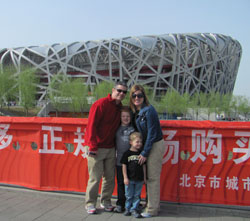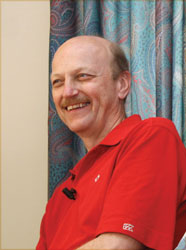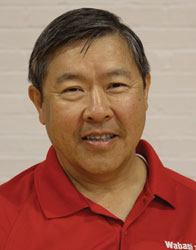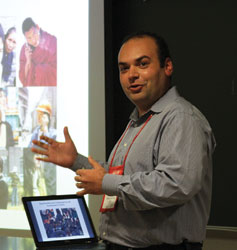Wabash Men Living and Working in Asia
WM asked six alumni whose careers have taken them to Asia to offer their perspectives on working there. Some excerpts:
Chris Ings ’96
Finance, Procter & Gamble
Guangzhou, China, since August 2010
[Hometown] Indianapolis, IN
[major] Economics

“The pace of change in China is so rapid. Strategies always need to be reworked to ensure they capture this change. Another key difference is the fragmentation of the market. When I was in the U.S., if you made your top 15 customers happy, you had taken care of 80 percent of your business. In China, if you do well with your top 15 customers, you have taken care of 35 percent of the business.
“It’s most interesting to watch a country grow economically at such a fast pace as it tries to balance that with traditions and cultures that have been around for generations. There are times that it feels like a place that is very conflicted.”
Seth Ditchcreek ’04
English Teacher, Language Center Manager, Shanghai;
Japan 2004-2004; China 2006—present
[Hometown] Valparaiso, IN
[major] Economics
“At Wabash I took Professor [David] Blix’s classes on Asian religions and another on Taoism,” Seth Ditchcreek recalls. “That began my underlying interest in China.
“One cultural difference I find striking is that most Chinese I know have no idea what is happening in the outside world, let alone another part of China. They tend to only care about what is happening in their lives and how things will directly impact them.
“I have tried to talk with my students about current events or other cultures, but this doesn’t go well.
People here are too focused on their lives and their families to really care what the government is doing, and many people say they can’t change things, so why try.”
Michael Kelley ’70
Metals trader and consultant
Traveling throughout East Asia since 1968
[Hometown] Gary, IN
[major] History
 Mike Kelley took Chinese at Wabash in the late 60s and between his junior and senior years spent a few months in Taiwan studying Chinese at the Taipei Language Institute. He took Japanese in graduate school after serving in the Navy and spent a semester in Japan earning his master’s in international management. He then lived in Tokyo for three years, starting up and running a subsidiary of a large U.S. corporation.
Mike Kelley took Chinese at Wabash in the late 60s and between his junior and senior years spent a few months in Taiwan studying Chinese at the Taipei Language Institute. He took Japanese in graduate school after serving in the Navy and spent a semester in Japan earning his master’s in international management. He then lived in Tokyo for three years, starting up and running a subsidiary of a large U.S. corporation.
“I traveled Asia extensively during these years, but China was still only a barely awake giant, with very few business oppor-tunities,” Kelley recalls. “When I first went to Taiwan, I was a 20-year-old kid from Gary, IN—a white kid from a predominantly black high school—who had never even seen an ocean before, much less flown across the Pacific. I had almost no preconceived notions, which was good—I just absorbed and assimilated. And I already knew how to be a minority, another unanticipated advantage.”
Now traveling to China a few times a year for business, Kelley knows building good relationships is critical to success in China.
“There is no established rule of law, no UCC for business to be based on. It is not a place for Boy Scouts—the rule of the jungle can prevail. What rules there are continue to change as the government makes it up as they go along. Your business partner can walk away from a contract without a worry of any legal consequence. This puts the emphasis on personal relationship building—using your experience and your gut to judge who you can trust, and who should be avoided.
“There are good people to do business with, but you always need to keep your antennae twitching for what might be changing in the environment around you.”
 Kai Chin was born in China and lived with his mother and grandparents there until he was five years old, when he and his mother rejoined his father in the U.S. He grew up on the lower eastside of New York City.
Kai Chin was born in China and lived with his mother and grandparents there until he was five years old, when he and his mother rejoined his father in the U.S. He grew up on the lower eastside of New York City. “While I was working for Motorola in Libertyville, my boss approached me about a potential position in China,” Khurram Tahir recalls. “I had a great one-hour conversation with our president in China, after which he basically said, ‘If we need you to move in a month, can you do it?’ I said ‘yes.’ A month later I was there.
“While I was working for Motorola in Libertyville, my boss approached me about a potential position in China,” Khurram Tahir recalls. “I had a great one-hour conversation with our president in China, after which he basically said, ‘If we need you to move in a month, can you do it?’ I said ‘yes.’ A month later I was there.